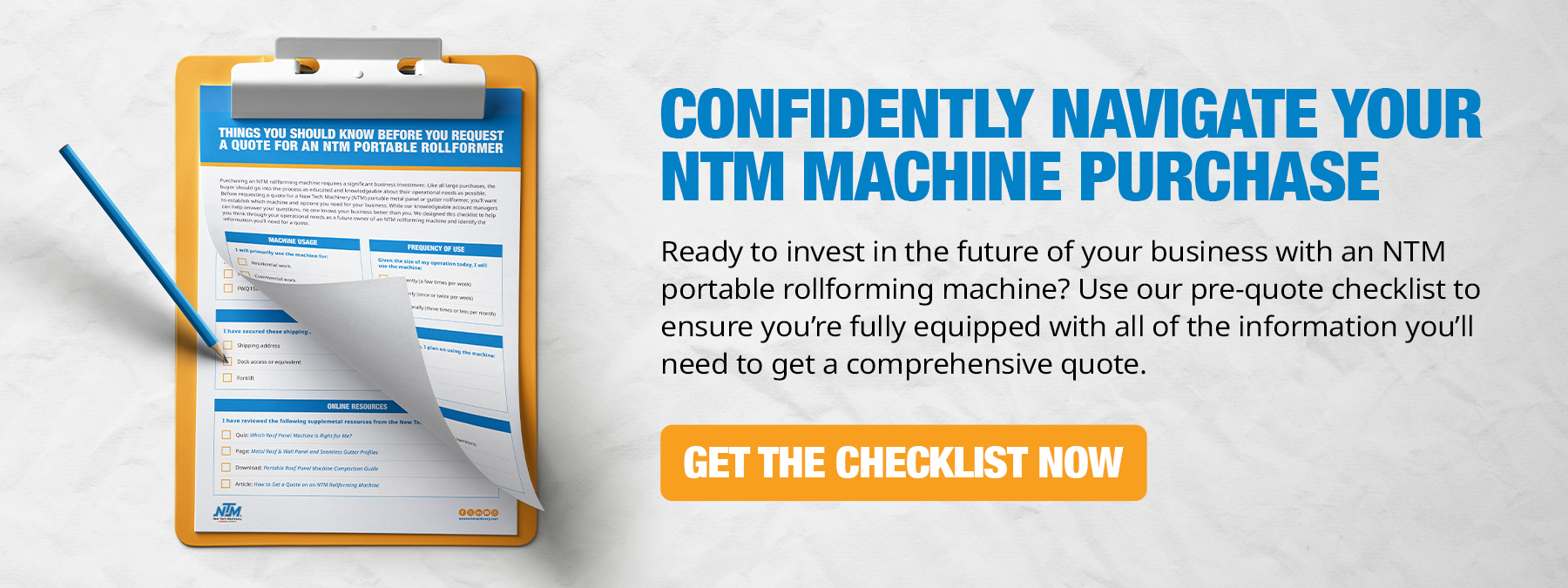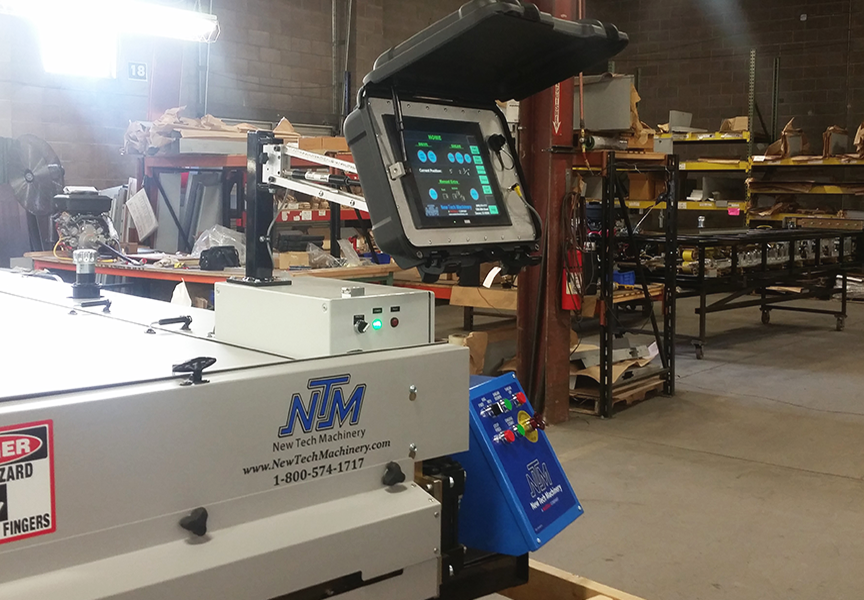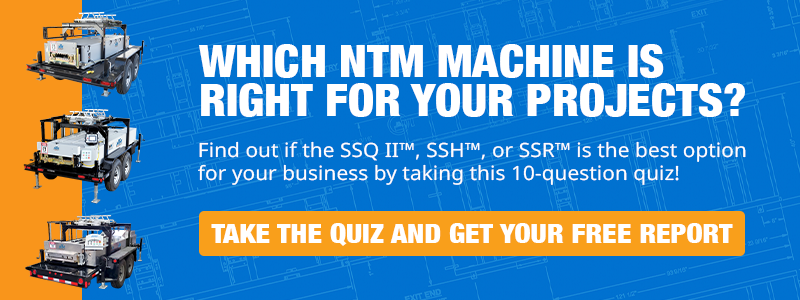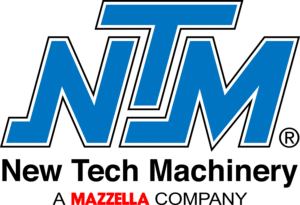Comparison: NTM’s SSR, SSH, and SSQ II Portable Rollformers
As the metal construction industry grows, so does competition. If you’re a contractor purchasing metal panels from a manufacturer you may already be behind the curve. Some contractors have told us about new operations recently moving into their territories and setting up shop. While there may be enough room for another competitor, eventually expansion from newcomers will start to edge in on your market.
The fact is, whether you’re a contractor just starting out or you’ve been in the metal roofing business for twenty years, you’re going to have to think about ways to differentiate yourself from the competition.
One longtime manufacturer who owns several NTM machines told us about one way he has a leg up—he can provide service faster than his competitors. National manufacturing operations have slower response times as contractors must wait for orders to be filled, which could take two or three weeks just for the manufacturing process.
With a portable rollformer, contractors can run panels at will. You can eliminate quotes and purchase order processes, and manufacturing and transportation lead times.
Providing prompt, quality service should be your calling card if you want a competitive edge. However, you must have the right equipment for the job.
As a contractor, owning a portable rollforming machine allows you to provide prompt service with customized metal panels run on-site.
As industry leaders for over 30 years, New Tech Machinery (NTM) has helped contractors and manufacturers like you build their businesses with portable rollforming machines.
In this article, we’ll compare our three most popular metal panel machines—the SSR™ MultiPro Jr. Roof Panel Machine, the SSH™ MultiPro Roof Panel Machine, and the SSQ II™ MultiPro Roof and Wall Panel Machine, so that you can learn the differences and decide which one is right for your operation.
You’ll learn:
- Key differences between the SSR, SSH, and SSQ rollformers
- Panel profiles available for each machine
- Material types and panel widths
- Options & Accessories
- Pricing for each machine
- Considerations when choosing a machine
- Training

What Are the Key Differences Between These Portable Rollformers?
Knowing the differences between NTM’s most popular machines is essential to purchasing the right one.
The two most similar machines are the SSR and the SSH. While both run the same seven standing seam panels, there are some mechanical differences in the way the machines operate.
The SSQ II is in a class of its own. No other portable metal panel machine in the industry is capable of running 16 different panel profiles and offers the advanced options of the SSQ II MultiPro. It’s our flagship model for good reason.
Now, get ready to learn the differences between these three top-tier portable rollformers and figure out which one can take your operation to the next level and give you the competitive edge you need against the competition.
Drives
At NTM, we use polyurethane drive rollers on all rollforming machines; in fact, we were the first manufacturer to do so. Polyurethane rollers enable machine users to run various types and gauges of material through the machines with minimal, if any, adjustments needed.
Both the SSR and SSH are chain and sprocket driven and use eight polyurethane drive rollers to operate the drive system, whereas the SSQ II is gear driven to control speed and uses 16 polyurethane drive rollers.
Based on the number of drive rollers in each machine, the SSR and SSH machines can run up to 24 ga. steel, while the SSQ II, with more drive power, can run up to 22 ga. steel.
| SSR MultiPro Jr. | SSH MultiPro | SSQ II MultiPro |
|---|---|---|
| Manually Powered, infinitely adjustable, hardened tool steel blades & shear dies | Hydraulically powered, infinitely adjustable, hardened tool steel blades & shear dies, panel recognition safety system | Hydraulically powered, infinitely adjustable, hardened tool steel blades & shear dies, panel recognition safety system |
Manual vs. Hydraulic Shears
One major difference between the machines is the forward-pulling manual shear on the SSR. On the manual shear, the machine operator cuts the panel using a shear handle. The downside to this is it’s more labor-intensive to operate and it can prove tiring, especially on demanding jobs requiring many panels. That said, we’ve seen contractors build their businesses using an SSR, so its capabilities shouldn’t be underestimated.
The SSH and SSQ II both feature a hydraulic drive and shear. This automates the panel cuts, making the fabrication process much easier and faster. These shears can also be programmed and operated with some of our controllers.

Controllers
SSR MultiPro Jr.
Push-button RUN/ JOG controls at entry and exit ends: A basic controller with forward and reverse RUN/JOG controls at both ends of the machine.
Optional SSR controllers
Remote 4-button start: A remove 4-button controller with start/ stop/ forward/ reverse functions. Allows the operator to control fabrication without having to stand at the entry or exit end of the machine. Cost: $2,700.
EZ-Counter computerized length controller*: Program up to 50 different panel lengths and automatically run the panels to the specified length. Cost: $3,100.
*A batch control is not an integral feature of the EZ-Counter, only length control. The EZ-Counter runs one panel at a time and must be reset for each panel and length.

SSH MultiPro
Standard SSH Controller
PLC Batch / Length Computerized Controller with forward/ reverse RUN/ JOG controls: The PLC batch and length computer controller allows for more efficient operation of the SSH. It has help screens for quick user assistance and troubleshooting and can program up to 99 different jobs or panel lengths. The PLC also includes touchscreen operation, material tracking, calculating coil length, and auxiliary shearing.
Optional SSH remote control
Remote control 4-button start: A remove 4-button controller with start/ stop/ forward/ reverse functions. Allows the operator to control fabrication without having to stand at the entry or exit end of the machine. Cost: $2,700.
SSQ II MultiPro
Push-button RUN/ JOG controls at entry and exit ends: A basic controller with forward RUN/JOG and reverse controls only.

Optional SSQ II Controller
UNIQ® Automatic Control System: The UNIQ controller offers the most robust features of any rollforming machine controller on the market.
The UNIQ features:
- 7” Touch Screen: Features a lockable metal cover with screen guards to reduce glare.
- Troubleshooting Screens: Enhanced with pop-ups that guide operators through common issues.
- Coil Calculator: Estimates the remaining material based on coil diameter and thickness.
- Job and Part Entry: Easily input job details directly into the system.
- Operation Modes: Switch between automatic and manual operation using the touch screen or push-button controls.
- USB Port: Import a 600-panel length cut list or export project details for further analysis.
- Notching Functionality: Essential for the SSQ II, the UNIQ is required to run the notching system.
- Precision: Accurate within 1/8 inch.
Cost: $20,700 (unless sold as part of a package).
Power
SSR MultiPro Jr.
Electric motor: 1.5 HP, 120V, 60 Hz, 1PH, 18 amp (220V option available at an additional cost). A gas engine is not an option on the SSR.
Speed: Appx. 30’/ min
SSH MultiPro
Quick-Change Power-Pack (gas or electric)
Speed: Appx. 60’/ min
SSQ II MultiPro
Quick-Change Power Pack (gas or electric)
Speed: Appx. 75’/ min
NOTE: On the SSH and SSQ II, electric power options are 220V or greater. 110V is not available on these machines due to hydraulics and power requirements.

Panel Profiles
SSR and SSH Profiles
The SSR and SSH can produce the same seven roof profiles with 1” or 1.5” seam heights, including mechanical seam, snap-lock, and snap-lock with slotted flange. Both machines include your choice of one panel profile with the base price.
SSQ II Profiles
The SSQ II is capable of producing 16 different roof and wall panel profiles, including mechanical seam up to 2.5” seam height, snap-lock up to 2” seam height, 1” and 1.5” flush wall/ soffit/ underdeck, and board and batten vertical siding panel profile.
Profiles for the SSQ II are purchased separately at a discounted price (unless purchased in a package). The price discount is $10,600 for a residential profile and $21,200 for a commercial profile. The discount is only applied to the first profile. Additional profiles are available at their regular prices.
A note on purchasing profiles: Some machine buyers want to choose the most expensive profile for their machine thinking it will give them the biggest savings. So, if they’re getting an SSQ II and the first profile is discounted, they may be tempted to choose the $34,800 trapezoidal mechanical seam panel, one of our most expensive, which is a great choice if you see a market demand for it. Otherwise, the best panel profile to choose is the one you plan to use the most. Note: If you purchase multiple profiles with the machine, we will discount the one that’s most expensive.
| Profile | SSR MultiPro Jr. | SSH MultiPro | SSQ II MultiPro |
| SS100 1″ Mechanical Seam | ✓ | ✓ | ✓ |
| SS150 1.5″ Mechanical Seam | ✓ | ✓ | ✓ |
| SSQ200/ SSQ210A 2″ Mechanical Seam | ✓ | ||
| SS450/ SS450SL 1.5″ Snap-Lock | ✓ | ✓ | ✓ |
| SSQ550 1.5″ Snap-Lock | ✓ | ||
| SSQ675 1.75″ Snap-Lock | ✓ | ||
| FF100 1″ Snap-Lock With Slotted Flange | ✓ | ✓ | ✓ |
| FF150 1.5″ Snap-Lock With Slotted Flange | ✓ | ✓ | ✓ |
| T-Panel | ✓ | ✓ | ✓ |
| TRQ250 2.5″ Mechanical Seam Trapezoid | ✓ | ||
| SSQ275 2″ Snap-Lock/ Mechanical Seam | ✓ | ||
| FWQ100 1″ Flush wall/Soffit/Underdeck Panel With Adjustable Reveal | ✓ | ||
| FWQ150 1.5″ Flush Wall/ Soffit/ Underdeck Panel With Adjustable Reveal | ✓ | ||
| BB750 Board & Batten Siding | ✓ |
Ribs/ Striations
All three machines can run Bead ribs (standard or wide); Pencil ribs (small or large); V-ribs (small or large); or Striation ribs. All machine purchases include one set of rib or striation rollers (capable of producing two ribs on a panel, other than striation ribs), and additional styles can be purchased separately if desired.
Materials and Widths
SSR MultiPro Jr. Roof Panel Machine
- Coil widths: 15” to 20”.
- Maximum coil diameter: 32” with an overhead reel rack; 45” with the free-standing decoiler.
- Finished panels: 12” to 16” wide (variable depending on panel profile).
Recommended Materials
- 28 ga. to 24 ga. painted steel, Galvalume, or coated galvanized (0.4mm to0 .6mm)
- .027” to .040” painted aluminum (0.7mm to 1.0mm)
- 16 oz. to 20 oz. 3/4 hard copper (0.5mm to 0.7mm)
SSH MultiPro Roof Panel Machine
- Coil widths: 14” to 24”.
- Maximum coil diameter: 32” with an overhead reel rack; 45” with a free-standing decoiler.
- Finished panel widths: 12” to 20” wide (variable depending on the panel profile).
Recommended Materials
- 28 ga. to 24 ga. painted steel, galvanized, or aluminized (.4mm to .6mm)
- .027” to .040” painted aluminum (0.7mm to 1.0mm)
- 16 oz. to 20 oz. 3/4 hard copper (0.5mm to 0.7mm)
- 26 ga. terne-coat stainless steel (0.6mm)
SSQ II MultiPro Roof and Wall Panel Machine
- Coil Widths: 15” to 30” (381mm to 762mm)
- Maximum Coil Diameter: 32” with the Overhead Reel Rack; 45” with the Free Standing Decoiler
- Finished Panel Widths: 12” to 24” (variable depending on panel profile)
Recommended Materials
- Painted Steel: 28 ga. to 22 ga. (0.4mm to 0.8mm) (painted, Galvalume, coated galvanized)
- 50 ksi maximum for 24 to 22 ga.
- Painted Aluminum: .027” to .040” (0.7mm to 1.0mm)
- Copper: 16 oz. to 20 oz. 3/4 Hard (0.5mm to 0.7mm)
- Note: Notching not recommended with copper.
- Terne Coat Stainless: 26 ga. (0.5mm) Note: Notching not recommended with terne coat.
While both machines can run similar thicknesses of metal material, the main differences between the SSH and SSR are the coil widths and the finished panel widths. The SSH is the better option if you want to make wider panels.
The SSQ can handle thicker 22-gauge steel and finished panel widths of up to 24”.
| SSR MultiPro Jr. | SSH MultiPro | SSH MultiPro | |
| Materials Run | Runs up to 24 gauge painted steel, .040″ aluminum, and 16 oz. to 20 oz. 3/4 hard copper | Runs up to 24 gauge painted steel, .040″ aluminum, and 16 oz. to 20 oz. 3/4 hard copper | Runs up to 22-guage painted steel, .040 aluminum, and 16 oz. to 20 oz. 3/4 hard copper |
| Coil Width | 15″ to 20″ wide finished panels | 12″ to 20″ wide finished panels | 12″ to 24″ wide finished panels |
| Finished Panel Width | 12″ to 16″ (variable depending on panel profile) | Finished panel widths: 12” to 20” wide (variable depending on the panel profile). | Finished Panel Widths: 12” to 24” (variable depending on panel profile) |
Options & Accessories
While the SSR and SSH offer many of the same options and accessories, the SSQ II offers some accessories not available on any other machine. Popular options for the SSQ II include:
Panel notching: With panel notching, notches are punched before the legs are formed for a clean cut. A finished panel has a 1” wide strip at each end for hemming. Punchers are hydraulically-powered and computer-controlled with the UNIQ Automatic Control System (required for panel notching). Notches can be offset for angled cuts. Snap-seam panels are notched with a profiled flap to be used as a closure.
Cost: depends on the panel profile selected. Contact an account manager for more information.
Angle slitting: Attaches to the exit end of the SSQ II Roof Panel Machine. Slits any angle from 90° to 35°. Slits panels up to 24” (610mm) wide. Note: Angle slitting only works with notched panels, as the slitter does not cut through formed panel legs.
Cost: $9,500

SSR, SSH, and SSQ II Pricing
The SSR MultiPro Jr. Roof Panel Machine starts at $41,200. This price includes choice of one panel profile and choice of one style of rib rollers, as well as a dual overhead reel rack, one expandable arbor/reel, and (2) ROSR-10 run-out tables for a total of 20′.
The SSH MultiPro Roof Panel Machine starts at $65,890. This price includes choice of one panel profile and choice of one style of rib rollers, as well as choice of gas or electric quick-change power pack, and the PLC computer batch/length controller.
The SSQ II MultiPro Roof and Wall Panel Machine starts at $63,400. This price does not include a profile*. As mentioned, your first profile is discounted to $10,600 for a residential profile or $21,200 for a commercial profile. Additional profiles are available at their regular listed prices.**
*A setup fee of $2,100 is added to the cost of all SSQ II machines ordered without a panel profile.
**The SSQ II does not include a profile as we’ve found that some of our customers own several SSQ/SSQ II machines and have multiple panel profiles, so they prefer to purchase the machine without a profile to use existing profiles they already have. For example, due to demand, they may want a machine exclusively to run board and batten, rather than swapping it out with other profiles. In this case, it’s cheaper for them to purchase the machine without the profile. For those who do need to purchase a machine with a profile, we’re offering that first profile at a discounted rate.
Choosing the Right Machine
Deciding on the right machine comes down to four factors: Market, needs, budget, and goals.
First, figure out your market. What profiles do customers want? Also, what size projects are you planning to do?
Based on that, what are your needs? Are you a contractor performing multiple operations and just need to add metal roofing for the occasional job? If so, you can probably get by with just an SSR. If you plan on centering your business around residential and light commercial roofing, you can go with either the SSR or SSH.
If you’re planning on doing a good deal of large commercial structures, rural buildings, or residential complexes, or if you also want to include soffits, underdecking, and flush wall and/or board and batten, then the SSQ II is the obvious choice. It is the most versatile machine on the market.
Next, think about your growth. You probably don’t want to purchase an SSR if in a year or two you plan on expanding into a larger, more competitive market. Don’t just purchase for today if you think you’re going to need a faster, more versatile machine in a year or two. It’s better to grow into your machine than to grow out of it too soon.
Lastly, think about your budget. You may already have jobs lined up that give you an idea of your immediate return on your investment. Or maybe you’re starting with just a rollforming machine and a sign on the door. Either way, purchasing a piece of equipment like a portable metal panel machine is a large investment. Not only do you have to think about the cost of the machine, you have to factor in the costs of accessories, a trailer, a truck, tools, and other equipment. Not to mention the cost of materials, maintenance, etc. Get out your calculator and start adding it all up, then think about the best way to pay for it all. If you don’t have the funds on-hand, you’ll need to look at financing options. Also, look into tax breaks like the Section 179 tax deduction. Once you’ve decided which machine is right, you can work towards putting together a finance plan that will fit your monthly budget.

Training
Training is one of the most important aspects of purchasing a machine. Imagine buying a plane, never having flown before. You’re going to want a few lessons before that first trip down the runway. Learn the ins and outs of your new portable rollformer so that you’re getting the most out of it. Learn how to make changeovers, adjust for a variety of materials, and more.
Training is free to all new machine owners at the New Tech Machinery plant in Aurora, CO. Training is open to the machine owners, operators, and crew. We strongly recommend you bring your team in for training so that all employees can learn the functions, proper operations, and safe use of your new rollforming equipment.
Training can be scheduled at your location for an additional cost. Contact our Service Department for more information.
To find out more or to get a quote on the SSR, SSH, SSQ II or any of our machines or accessories, contact us to speak to one of our knowledgeable account managers.
Specs Breakdown
| SSR MultiPro Jr. | SSH MultiPro | SSQ II MultiPro |
|---|---|---|
| Residential and light commercial | Residential and light commercial | Residential and commercial |
| 7 panel profiles available | 7 panel profiles available | 16 panel profiles available |
| Produces up to 30’/ min | Produces up to 60′ per min | Produces up to 75’/ min |
| Runs up to 24 gauge painted steel, .040″ aluminum, and 16 oz. to 20 oz. 3/4 hard copper | Runs up to 24 gauge painted steel, .040″ aluminum, and 16 oz. to 20 oz. 3/4 hard copper | Runs up to 22-guage painted steel, .040 aluminum, and 16 oz. to 20 oz. 3/4 hard copper |
| 12″ to 16″ wide finished panels | 12″ to 20″ wide finished panels | 12″ to 24″ wide finished panels |
| Waterproof electric system | PLC batch/ length computer controller included | Push button RUN/JOG controls at entry and exit ends (optional UNIQ Automatic Control System for added cost). |
| 110V 60Hz or 22V 50Hz electric motor | Gas and/ or electric Quick-Change Power Pack | Gas and/ or electric Quick -Change Power Pack |
| Forward-pulling manual shear | Hydraulic drive and shear | Hydraulic drive and shear |
| Complete profile changeover in an hour with EZE change roller system | Complete profile changeover in an hour with EZE change roller system | Complete profile changeover in 45 minutes with Quick-Change roller systems |

